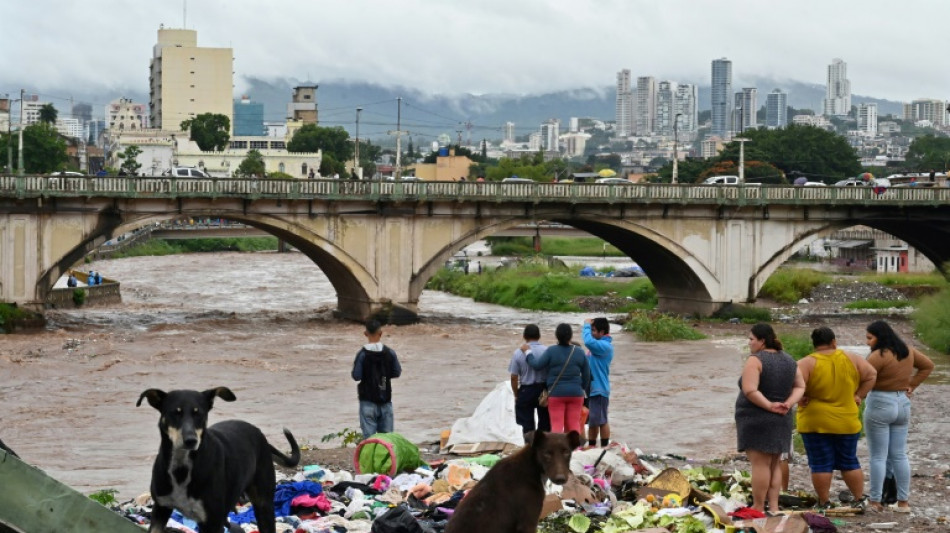
-
 Brazil's imprisoned Bolsonaro hospitalized ahead of surgery
Brazil's imprisoned Bolsonaro hospitalized ahead of surgery
-
Serbia court drops case against ex-minister over train station disaster

-
 Investors watching for Santa rally in thin pre-Christmas trade
Investors watching for Santa rally in thin pre-Christmas trade
-
David Sacks: Trump's AI power broker

-
 Delap and Estevao in line for Chelsea return against Aston Villa
Delap and Estevao in line for Chelsea return against Aston Villa
-
Why metal prices are soaring to record highs

-
 Stocks tepid in thin pre-Christmas trade
Stocks tepid in thin pre-Christmas trade
-
UN experts slam US blockade on Venezuela

-
 Bethlehem celebrates first festive Christmas since Gaza war
Bethlehem celebrates first festive Christmas since Gaza war
-
Set-piece weakness costing Liverpool dear, says Slot

-
 Two police killed in explosion in Moscow
Two police killed in explosion in Moscow
-
EU 'strongly condemns' US sanctions against five Europeans

-
 Arsenal's Kepa Arrizabalaga eager for more League Cup heroics against Che;sea
Arsenal's Kepa Arrizabalaga eager for more League Cup heroics against Che;sea
-
Thailand-Cambodia border talks proceed after venue row

-
 Kosovo, Serbia 'need to normalise' relations: Kosovo PM to AFP
Kosovo, Serbia 'need to normalise' relations: Kosovo PM to AFP
-
Newcastle boss Howe takes no comfort from recent Man Utd record

-
 Frank warns squad to be 'grown-up' as Spurs players get Christmas Day off
Frank warns squad to be 'grown-up' as Spurs players get Christmas Day off
-
Rome pushes Meta to allow other AIs on WhatsApp

-
 Black box recovered from Libyan general's crashed plane
Black box recovered from Libyan general's crashed plane
-
Festive lights, security tight for Christmas in Damascus

-
 Zelensky reveals US-Ukraine plan to end Russian war, key questions remain
Zelensky reveals US-Ukraine plan to end Russian war, key questions remain
-
El Salvador defends mega-prison key to Trump deportations

-
 Stranger Things set for final bow: five things to know
Stranger Things set for final bow: five things to know
-
Grief, trauma weigh on survivors of catastrophic Hong Kong fire

-
 Asian markets mixed after US growth data fuels Wall St record
Asian markets mixed after US growth data fuels Wall St record
-
Stokes says England player welfare his main priority

-
 Australia's Lyon determined to bounce back after surgery
Australia's Lyon determined to bounce back after surgery
-
Stokes says England players' welfare his main priority

-
 North Korean POWs in Ukraine seeking 'new life' in South
North Korean POWs in Ukraine seeking 'new life' in South
-
Japanese golf star 'Jumbo' Ozaki dies aged 78

-
 Johnson, Castle shine as Spurs rout Thunder
Johnson, Castle shine as Spurs rout Thunder
-
Thai border clashes hit tourism at Cambodia's Angkor temples

-
 From predator to plate: Japan bear crisis sparks culinary craze
From predator to plate: Japan bear crisis sparks culinary craze
-
Asian markets mostly up after US growth fuels Wall St record

-
 'Happy milestone': Pakistan's historic brewery cheers export licence
'Happy milestone': Pakistan's historic brewery cheers export licence
-
Chevron: the only foreign oil company left in Venezuela

-
 US denies visas to EU ex-commissioner, four others over tech rules
US denies visas to EU ex-commissioner, four others over tech rules
-
SMX Is Transitioning From Single Deployments to Supply-Chain Infrastructure

-
 Each SMX Partnership Opens a Market, the Portfolio Multiplies the Value
Each SMX Partnership Opens a Market, the Portfolio Multiplies the Value
-
CORRECTION: Nextech3D.ai Provides Shareholder Update on Krafty Labs Acquisition and Announces $321,917 CEO Investment

-
 Why SMX's Partnerships Expand Value Faster Than Its Cost Base
Why SMX's Partnerships Expand Value Faster Than Its Cost Base
-
Dynamite Blockchain Delivers Record Q3 2025

-
 Cosmos Health Is Building a Platform, and Tariffs Are Accelerating the Strategy
Cosmos Health Is Building a Platform, and Tariffs Are Accelerating the Strategy
-
SMX's Integrated Value Proposition: One System, Many Markets, Compounding Leverage

-
 Dermata Therapeutics Announces up to $12.4 Million Private Placement Priced At-The-Market Under Nasdaq Rules
Dermata Therapeutics Announces up to $12.4 Million Private Placement Priced At-The-Market Under Nasdaq Rules
-
Goldgroup Secures Ownership of the San Francisco Gold Mine Acquiring 100% of Molimentales del Noroeste, S.A. De C.V.

-
 Alta Copper Announces Filing and Mailing of Meeting Materials for the Special Meeting of Shareholders and Optionholders to be Held on January 26, 2026
Alta Copper Announces Filing and Mailing of Meeting Materials for the Special Meeting of Shareholders and Optionholders to be Held on January 26, 2026
-
Pantheon Resources PLC Announces TR-1: Notification of Major Holdings

-
 Bridgeline Expands Footprint with Closeout Retailer Choosing HawkSearch for Its On-Site Search Experience and Personalization
Bridgeline Expands Footprint with Closeout Retailer Choosing HawkSearch for Its On-Site Search Experience and Personalization
-
Koepka leaves LIV Golf: official

| SCS | 0.12% | 16.14 | $ | |
| RELX | -0.21% | 41.045 | $ | |
| CMSC | 0.26% | 23.07 | $ | |
| RYCEF | 1.29% | 15.56 | $ | |
| GSK | -0.01% | 48.845 | $ | |
| NGG | 0.08% | 77.3 | $ | |
| CMSD | 0.13% | 23.05 | $ | |
| RIO | -0.36% | 80.68 | $ | |
| AZN | 0.25% | 92.37 | $ | |
| RBGPF | 1.28% | 81.26 | $ | |
| BTI | 0.25% | 57.185 | $ | |
| BP | -0.76% | 34.32 | $ | |
| VOD | 0.23% | 13.09 | $ | |
| BCC | 1.74% | 74.53 | $ | |
| BCE | 0.76% | 22.905 | $ | |
| JRI | 0.26% | 13.445 | $ |

Climate finance's 'new era' shows new political realities
Rich countries' promise of $300 billion a year in climate finance brought fury at talks in Baku from poor nations that found it too paltry, but it also shows a shift in global political realities.
The two-week marathon COP29 climate conference opened days after the decisive victory in the US presidential election of Donald Trump, a sceptic both of climate change and foreign aid.
In the new year, Germany, Canada and Australia all hold elections in which conservatives less supportive of green policies stand chances of victory.
Britain is an exception, with the new Labour government putting climate high back on the agenda, but in much of the West, concerns about inflation and budgetary shocks from Russia's invasion of Ukraine have dented enthusiasm for aggressive climate measures.
At COP29, Germany and the European Union maintained their roles championing climate but also advocated a noticeably practical approach on how much money historical polluters should give poorer countries.
"We live in a time of truly challenging geopolitics, and we should simply not have the illusion" otherwise, European climate commissioner Wopke Hoekstra told bleary-eyed delegates at COP29's pre-dawn closing session Sunday, as activists in the back loudly coughed to drown him out.
But he vowed leadership by Europe, hailing COP29 as "the start of a new era for climate finance".
German Foreign Minister Annalena Baerbock, a Green party member and longtime climate advocate, called for flexibility on ways to provide funding.
Europe should "live up to its responsibilities, but in a way that it doesn't make promises it can't keep", she said.
Avinash Persaud, special advisor on climate change to the president of the Inter-American Development Bank, called the final deal "the boundary between what is politically achievable today in developed countries and what would make a difference in developing countries".
Activists say that climate funding is a duty, not choice, for wealthy nations whose decades of greenhouse gas emissions most contributed to the crisis that most hits the poorest.
This year is again set to be the hottest on record on the planet. Just since COP29, deadly storms have battered the Philippines and Honduras, and Ecuador declared a national emergency due to drought and forest fires.
- 'Creative accounting'? -
Wealthy historic emitters' promise of $300 billion a year by 2035 is a step up from an expiring commitment of $100 billion annually, but all sides acknowledge it is not enough.
The COP29 agreement cites the need for $1.3 trillion per year, meaning a whopping $1 trillion a year needs to come from elsewhere.
Even within the $300 billion commitment, some activists see too much wiggle room.
"It is, to some extent, almost an empty promise," said Mariana Paoli, the global advocacy lead at London-based development group Christian Aid.
She described the target as "creative accounting", saying there was not enough clarity on how much money would come from public funds and in grants rather than loans.
She acknowledged the politics of the moment but said that wealthy nations had options such as taxation on fossil fuel companies.
"There is a backlash because there is no political will," she said.
- Role for multinational banks -
In one closely scrutinised part of the Baku deal, countries will be able to count climate finance through international financial institutions toward the $300 billion goal.
The text states that it is "voluntary" -- potentially opening the way to include China, which is the world's largest emitter but refuses to have requirements like long-developed countries.
In a joint statement at COP29, multilateral development banks led by the Washington-based World Bank Group but also including the Beijing-based Asian Infrastructure Investment Bank -- which has long faced US criticism -- expected that they together can provide $120 billion annually in climate financing and mobilise another $65 billion from the private sector by 2030.
Melanie Robinson, director of the global climate program at the World Resources Institute, said there were good reasons to rely on multinational development banks, including how much capital they can leverage and their tools to advance green policies.
"They are the most effective way to turn each dollar of finance into impact on the ground," she said.
She agreed that the $300 billion was insufficient but added, "It's a down payment on what we need."
Beyond the debate on dollar figures, she pointed to an initiative within the G20 by Brazil, which holds COP30 next year, to reform financial institutions so as to incorporate debtor nations as well as climate concerns.
"There is really a much bigger opportunity for us -- which is shifting the whole financial system," she said.
T.Ward--AMWN



